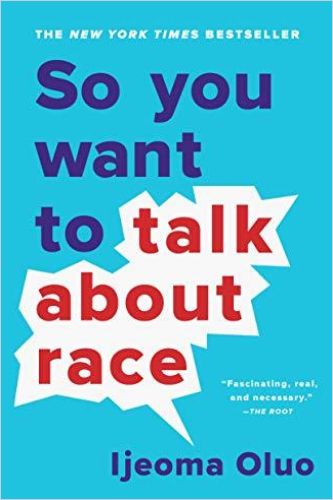In this indispensable guide, Nigerian-American New York Times best-selling author Ijeoma Oluo explores how – and why – to talk about race and racism.

Blunt Heartfelt Advice
Black Lives Matter protests in the United States have sparked national and worldwide discussion. Nigerian-American New York Times best-selling author Ijeoma Oluo – who also wrote Mediocre: The Dangerous Legacy of White Male America – explores race and racism in the United States and discusses how to address these subjects. Whether you’re new to racial consciousness or a seasoned activist seeking extra tools, Oluo’s indispensable guide provides personal insights and constructive arguments.
Her perceptive, timely work drew positive critical response to match its commercial success. Harper’s Bazaar, for example, named this one of the “10 Books to Add to Your Reading List in 2018,” and wrote, “Read it, then recommend it to everyone you know.” Worthy companion volumes and ancillary readings on the subject of racism, white privilege and supporting equality include, How to Be an Antiracist by Ibram X. Kendi and White Fragility by Robin DiAngelo.
Unequal Power Structure
When many people envision racism, they think of the Ku Klux Klan or neo-Nazis. Oluo stresses that onlookers may fail to realize how socially entrenched racism is, and they often overlook their part in a “white supremacist system.” Oluo states the baseline simply and clearly: Certain demographics have more power, and they wield that power – knowingly and unknowingly – to hurt other people and groups.
You don’t even have to ‘be racist’ to be a part of the racist system.Ijeoma Oluo
Remarkably, Oluo assumes that Americans actually want to discuss race. As she writes, people usually avoid discussing race, get defensive or argue that the root of inequality lies in something else, like class. Her book’s best-selling status proves Oluo’s keen sense of the zeitgeist: Americans, it seems, are at last ready to engage about race. She proves appropriately blunt and clear-headed.
Apologize, Learn and Persist
Oluo cautions white readers not to expect people of color to educate you. Focus on their concerns, the author urges, not on yourself. Don’t insist that they talk about race with you. Counterintuitively, she suggests discussing race with those who look like you.
When you say the wrong thing or a conversation is no longer productive, wrap it up. Oluo reminds you to say you are sorry – even if you didn’t hurt someone on purpose. She suggests that you consider gaffes as opportunities to examine your biases. Writing with powerful simplicity, she asserts that when you give up fighting a racist system, you’re complicit in it.
Oluo codifies that privileges – advantages you didn’t earn – accrue from race, gender identity, education level, mental health, social class, body size, sexual orientation, skin tone and disability status.
The School-to-Prison Pipeline
Law enforcement and school districts often operate, Oluo explains, with implicit bias that people of color are unpredictable and violent. Teachers disproportionately punish “students of color.” Some 70% of the students that schools refer to the police are Black. Oluo offers shocking statistics: one in three Black men and one in six Latino men end up behind bars.
If you are white, and you don’t want to feel any of that pain by having these conversations, then you are asking people of color to continue to bear the entire burden of racism alone.Ijeoma Oluo
Police officers, the author reports, are more likely to stop, arrest, inflict physical force on or kill people of color compared to whites. Blacks and Native Americans are four times more likely than whites to die at the hands of police. Oluo was 16 when she learned not to reach too quickly into the glove compartment for her identification because when she did, a police officer’s hand flew to his gun.
Affirmative Action Works
Since the 1960s, Oluo points out, affirmative action has attempted to level the unequal playing field for college admissions and US federal jobs. Expanding affirmative action, she argues, improves diversity. Affirmation action seeks to open workplaces and schools so their body of employees or students accurately represents their community.
The author presents a crucial point often ignored by affirmative action opponents: Affirmative action hiring targets are much lower than the disenfranchised group’s percentage of the population.
Microaggressions and Cultural Appropriation
Microaggressions, Oluo teaches, are deceptively casual actions or comments that reveal hidden biases. They spark feelings of isolation, depression and invalidation. She details how Black people must field invasive requests from whites, such as asking to touch their hair, a gesture that treats Black bodies like public property.Other microaggressions include racial slurs and degrading racist labels.
Society celebrates white people for embracing Black forms of culture – Oluo cites as a primary example the rapturous reception white rappers often receive. He implores members of all cultures to consider their actions before adopting traditions that belong to other cultures.
Model Minority
Oluo moves into compelling and seldom-addressed territory when she addresses stereotypes that paint Asian-Americans as a “model minority” that is prosperous, passive, hard-working and educated. She reveals that one-third of Asian-Americans struggle with reading, writing and speaking English. South Asians face anti-Muslim hate crimes, and Asian-American women experience intimate partner abuse at double the national average. Oluo regards the model-minority myth as a wedge between Asian-Americans and other people of color. She fervently believes all people of color should share their experiences.
Tone-Policing
As a child, Oluo idolized Martin Luther King Jr. as a peacemaker, and she demonized Malcolm X for his anger during the Civil Rights movement. She later realized that such false dichotomies often pigeonhole people of color.
For hundreds of years we have been told that the path to freedom from racial oppression lies in our virtue, that our humanity must be earned.Ijeoma Oluo
Once again, Oluo states painful truths with clarity: People of color, she avows, reel from the rage, grief and fear of living in an abusive system.
Persistent Small Actions
Oluo offers more than a guide to productive conversations. She offers basic actions anyone can perform to implement equality. Among the foremost steps she cites are electing diverse candidates, acting as a witness when police stop people of color, boycotting exploitative companies, supporting firms and creations by people of color, and speaking conscientiously and carefully. Words, as her timely, erudite, readable and memorable work prove, drive productive change.





